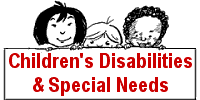|
|
What
is Autism?
What is autism?
Autism is a complex biological disorder that generally lasts throughout
a person’s life. It is called a developmental disability because
it starts before age three, in the developmental period, and causes delays
or problems with many different ways in which a person develops or grows.
In most cases, autism causes problems with:
- Communication, both verbal (spoken) and nonverbal (unspoken)
- Social interactions with other people, both physical (such as hugging
or holding) and verbal (such as having a conversation)
- Routines or repetitive behaviors, like repeating words or actions
over and over, obsessively following routines or schedules for their
actions, or having very specific ways of arranging their belongings
The symptoms of the disorder cut off people with autism from the world
around them.Children with autism may not want their mothers to hold them.
Adults with autism may not look others in the eye. Some people with autism
never learn how to talk. These behaviors not only make life difficult
for people who have autism, but also make life hard for their families,
their health care providers, their teachers, and anyone who comes in contact
with them.
Do all people with autism have the same symptoms?
Autism is a complex disorder that affects people differently. Because
people with autism have a lot of similarities and differences, doctors
now think of autism as a “spectrum” disorder; so rather than
being just one condition, autism is a group of conditions with a range
of similar features. Doctors use the term “autism spectrum disorder
(ASD)” to describe people with mild symptoms, severe symptoms, or
symptoms that fall anywhere in between.
Are there other things that might be signs of autism?
There are a number of things that parents, teachers, and others who care
for children can look for to determine if a child needs to be evaluated
for autism. The following “red flags” could be signs that a
doctor should evaluate a child for autism or a related communication disorder.
“Red Flags” include...
- The child does not respond to his/her name.
- The child cannot explain what he/she wants.
- Language skills or speech are delayed.
- The child doesn’t follow directions.
- At times, the child seems to be deaf.
- The child seems to hear sometimes, but not others.
- The child doesn’t point or wave bye-bye.
- The child used to say a few words or babble, but now he/she doesn’t.
- The child throws intense or violent tantrums.
- The child has odd movement patterns.
- The child is hyperactive, uncooperative, or oppositional.
- The child doesn’t know how to play with toys.
- The child doesn’t smile when smiled at.
- The child has poor eye contact.
- The child gets “stuck” on things over and over and can’t
move on to other things.
- The child seems to prefer to play alone.
- The child gets things for him/herself only.
- The child is very independent for his/her age.
- The child does things “early” compared to other children.
- The child seems to be in his/her “own world.”
- The child seems to tune people out.
- The child is not interested in other children.
- The child walks on his/her toes.
- The child shows unusual attachments to toys, objects, or schedules
(i.e., always holding a string or having to put socks on before pants).
- Child spends a lot of time lining things up or putting things in a
certain order.
What conditions are included in the autism spectrum disorder (ASD)
category?
Currently, ASD includes:
Autistic disorder (sometimes called “classic” autism)
Asperger syndrome
Childhood disintegrative disorder (CDD)
Rett syndrome
Pervasive Developmental Disorder Not Otherwise Specified (PDDNOS) or atypical
autism
Depending on his or her specific symptoms, a person with autism can be
in any one of these categories.
Condensed from NICHD's "Autism Fact. For more information visit
NICHD Autism.
|

